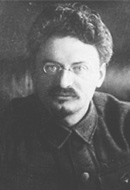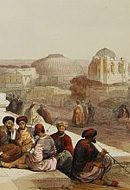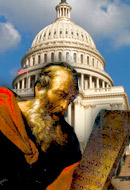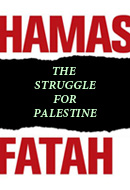People & Places
 Whose Holocaust?
Whose Holocaust?Friday, January 27, 2012 by Margot Lurie | Jewish Ideas Daily » Daily Features
For much of Europe, today is the UN-designated International Holocaust Remembrance Day. Secretary-General Ban Ki-moon has dedicated his address this year to children murdered by the Nazis, with the message that "the best tribute to the memory of these children is an ongoing effort to teach the universal lessons of the Holocaust, so that no such horror is visited upon future generations."
 Listening to Saddam
Listening to SaddamThursday, January 26, 2012 by Alex Joffe | Jewish Ideas Daily » Daily Features
In the debate over Iran's nuclear intentions, the question of rationality looms menacingly. How do Iran's rulers perceive cause and effect, calculate costs and benefits, and make policy decisions in order to maximize the well-being of their state and citizens? How do they understand the outside world?
 Trotsky Eats and Runs
Trotsky Eats and RunsWednesday, January 25, 2012 by Micah D. Halpern | Jewish Ideas Daily » Daily Features
I first heard the name Trotsky when I was seven years old. My grandfather, a Jewish tailor from Belarus who arrived in the goldene medine and pulled himself up by his bootstraps to own a men's suit factory in New York, had just gotten a swept-back haircut. He called it a Trotsky.
 Siren Songs
Siren SongsTuesday, January 24, 2012 by Shlomo Zuckier | Jewish Ideas Daily » Daily Features
"For your voice is sweet and your appearance pleasant" (Song of Songs 2:14). On the basis of this verse, Jewish law prohibits a man's listening to kol ishah, a woman's voice in song. Unlikely as it may seem, this prohibition has sparked a controversy that could shake the foundations of Israel's self-defense and self-definition.
 Whither the Alawites
Whither the AlawitesFriday, January 20, 2012 by Elliot Jager | Jewish Ideas Daily » Daily Features
Time does not appear to be on the side of Syria's minority Alawite-led regime. President Bashar Assad has reportedly been offered asylum in Moscow, which wants an orderly transition that will preserve Russian strategic interests. Other stories have Assad and his loyalists preparing mountain strongholds for a last-ditch stand.
 Jerusalem’s Ego and Id
Jerusalem’s Ego and IdThursday, January 19, 2012 by Alex Joffe | Jewish Ideas Daily » Daily Features
Biography is not the same as history. Biography charts the outer and inner life of a person—character, spirit, morality, emotion, perhaps even soul. History, by contrast, incorporates different narratives and pieces of evidence, seeks out new data, then rises above all the fragments with a synthesis.
 America the Biblical
America the BiblicalTuesday, January 17, 2012 by Diana Muir Appelbaum | Jewish Ideas Daily » Daily Features
The Greeks did not invent equality. Socrates, Aristotle, Plato, and the gang famously believed that the rich are different from you and me—not merely because they are shaped by their privileges but because they are actually, literally made of superior stuff.
 Gender Trouble
Gender TroubleMonday, January 16, 2012 by Yehudah Mirsky | Jewish Ideas Daily » Daily Features
Suddenly, it seems, gender segregation is everywhere in Israel—buses, army bases, Jerusalem sidewalks, Beit Shemesh schoolyards and, above all, the front pages. What is going on here? Why is all this happening now? Let's begin with the second question.
 Among the Literati
Among the LiteratiThursday, January 12, 2012 by Erika Dreifus | Jewish Ideas Daily » Daily Features
Some days, I can't help thinking back 25 years to my high-school French course, which is where I first encountered the concept of the juste milieu—the happy medium—and the difficulty of achieving it. Why is the happy medium so elusive? Why do I more often feel caught betwixt and between or, even among my fellow Jewish-American writers, alone?
 Two Palestines, Complete
Two Palestines, CompleteWednesday, January 11, 2012 by Elliot Jager | Jewish Ideas Daily » Daily Features
Some saw history in the making. With jubilation and fanfare Fatah and Hamas agreed last spring in Cairo to form an interim technocratic administration, hold parliamentary and presidential elections by May 2012 and, ultimately, to establish a national unity government.
Editors' Picks
The Battle for Jerusalem Abraham Rabinovich, Times of Israel. Israel's 1967 conquest of the Old City, as celebrated yesterday, has become part of the religious Zionist narrative. But whether or not it was divinely preordained, it was never planned by Rabin.
Returning to Tunisia Gil Shefler, Wall Street Journal. When last year's Lag BaOmer pilgrimage to Djerba was cancelled, many doubted the future of Tunisia's Jews. But the new Islamist government just passed a test of religious freedom.
With Friends Like These Benjamin Weinthal, Jerusalem Post. While the prevalence of overt anti-Zionism across Europe is notorious, it is less well known that even Europeans who claim to be pro-Israel are invariably hostile to the Jewish state.
Did Muhammad Exist? Daniel Pipes, National Review. As revisionist scholarship claims that Muhammad was not the founder of a new religion but an anti-Trinitarian rebel Christian leader, Islam is headed for a confrontation with higher criticism.
No Quarter Matti Friedman, Times of Israel. For its two million tourists, the Jewish Quarter of Jerusalem's Old City is the historical and spiritual center of Judaism. But the only Jews who lived there before 1948 were those too poor to leave.
The Spirit is Unwilling Mary Pilon, New York Times. Why won't the president of the International Olympic Committee allow for a moment of silence, in "the Olympic spirit," on the tragic anniversary of the 1972 murder of 11 Israeli athletes and coaches?
A Heretic in the Truth Zachary Micah Gartenberg, Jewish Review of Books. Spinoza takes Maimonides' characterization of miracles as divinely implanted—but still natural—anomalies in the regular course of things. Then Spinoza adds a twist.
E-vil? Micah Stein, Tablet. The ultra-Orthodox rally against the Internet is not merely about pornography. It's about Facebook, filters, accountability, and the maintenance of rabbinic authority. And then it is also about pornography.
Masonic Rites in the Holy Land Nadav Shragai, Israel Hayom. Below Jerusalem's Old City, a Freemason "laid my pocket Bible atop the stone in the middle of the cave and three candles around it which shower light . . ."
Hezbollah's Newest Threat Lee Smith, Tablet. The culture of resistance crafted by Hezbollah is on the wane, as many Shiites aren't eager to serve as human shields in the next round of warfare.

